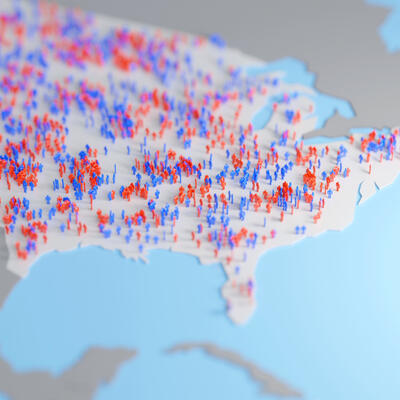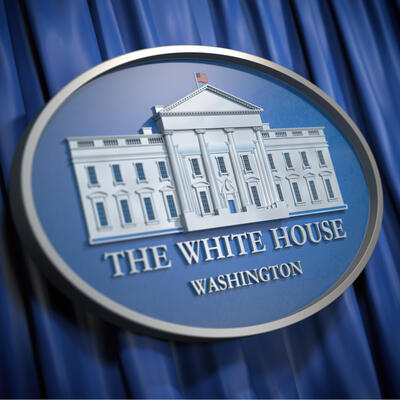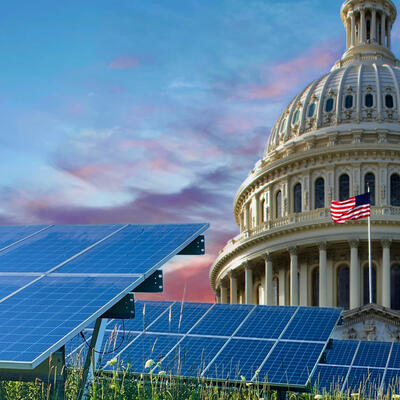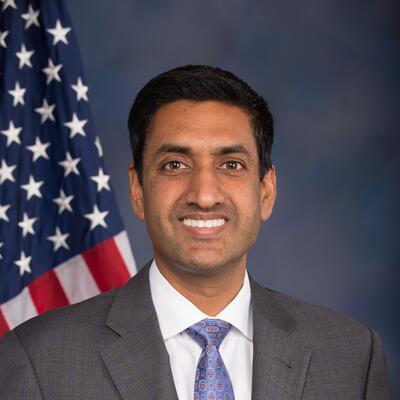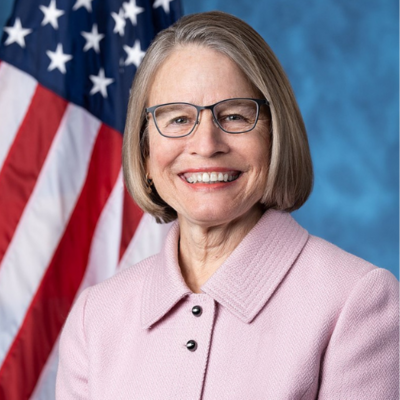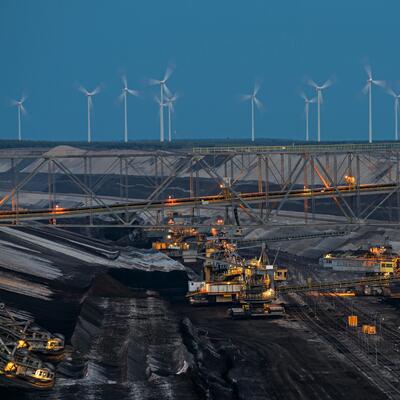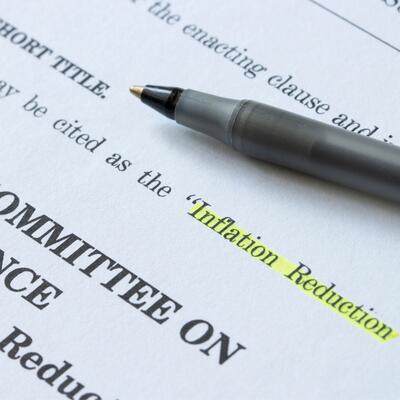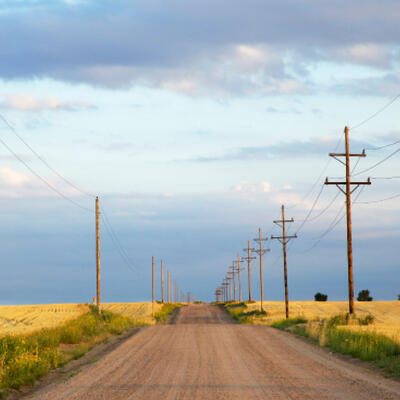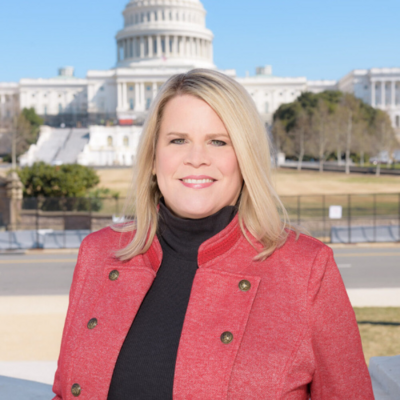
Green Energy / Red States
Guests

Emma Dumain

Heather Reams
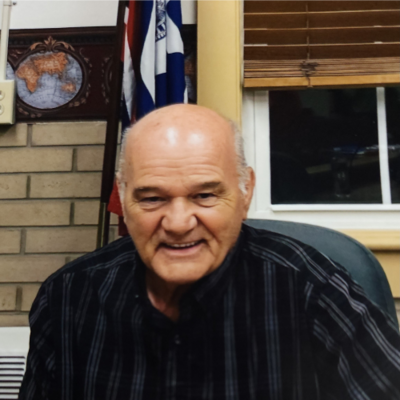
Terry Weickum
Summary
Billions of dollars from the Inflation Reduction Act have started flowing into renewable energy projects and manufacturing. That’s bringing jobs and revenue back to the country and to some areas abandoned by the oil, coal and gas industries. Despite the massive investments in their districts, some Republican politicians aren’t fans of the green energy companies moving into their backyards and are doing everything they can to repeal the Inflation Reduction Act – putting them at odds with their constituents. How do we advance the clean energy transition when it’s seen as a partisan issue?
Episode Highlights
3:38 Emma Dumain on who benefits from the Inflation Reduction Act
10:12 Emma Dumain on Republican energy and climate agenda
16:59 Emma Dumain on Republican permitting reform
22:40 Heather Reams on why she works on climate issues
25:24 Heather Reams on why climate messaging struggles in conservative areas
35:42 Heather Reams on permitting reform
41:59 Terry Weickum on his first encounters with the wind energy industry
45:10 Terry Weickum on his connection to the largest wind farm in the country
47:39 Terry Weickum on wind farm taxes
50:33 Terry Weickum on the energy transition
Resources From This Episode (4)
Full Transcript
Note: Transcripts are generated using a combination of automated software and human transcribers and may contain errors. Please check the actual audio before quoting it.
Greg Dalton: This is Climate One. I’m Greg Dalton.
Ariana Brocious: And I’m Ariana Brocious. The Inflation Reduction Act is the largest government expenditure EVER on climate and green industry.
Greg Dalton: The law has unleashed a wave of spending for established renewable energy like solar and wind and newer technologies such as green hydrogen and sustainable aviation fuel.
Ariana Brocious: And much of that money is flowing to states whose Congressional delegations actually voted AGAINST the IRA.
Greg Dalton: That’s right. They voted no, but are happy to take the dough. One utility, Florida Power and Light, is taking advantage of the Inflation Reduction Act solar tax credits and actually refunding $400 million in savings back to ratepayers – nearly 6 million customers. Fifteen Florida Republicans voted against that law. Other examples abound. Texas alone could see $131 billion from the law.
Ariana Brocious: And Texas is already a leader in wind and solar. An analysis by POLITICO found two-thirds of green-energy projects announced since passage of the IRA are going to Republican-held congressional districts.
Greg Dalton: Despite the investments in their districts, some Republican politicians aren’t fans of the green energy companies moving into their backyards – putting them at odds with their constituents, says energy reporter Emma Dumain.
Emma Dumain: The disconnect between what we talk about in Washington and what people talk about back home is very stark.
Ariana Brocious: Some of these investments are bringing jobs and revenue back to areas abandoned by fossil fuels and its associated industries, says Terry Weickum, mayor of Rawlins, Wyoming. And many people in these communities want and need new jobs, factories, and reliable, affordable renewable energy.
Terry Weickum: Quality of life begins with the paycheck. And when you lose thousands of jobs it makes you more open to other types of job producing industries.
Ariana Brocious: It’s kind of similar to Obamacare. When that federal health care program was rolled out, many Republicans opposed it for lots of reasons, but probably in part because it came from a Democratic administration. But many aspects of the law were – and remain – popular across the political spectrum.
Greg Dalton: And to be fair, if the bill had been passed by Republicans, Democrats would probably have reacted the same way initially. We are in a period of hyper-partisanship and political tribes reflexively oppose what others support.
Ariana Brocious: That’s something I talk about on today’s show with Heather Reams, President of Citizens for Responsible Energy Solutions. We talk about the importance of the messenger to help get all of us working toward the same end goal – a livable planet.
Heather Reams: The alarmist tone that comes with it just gets tuned out. So you’ve got to figure out how you bring the right message with the right messenger.
Greg Dalton: The Biden administration has embarked on a campaign across the country to let the people know which party is really responsible for the growth in jobs and reshoring manufacturing. President Biden recently spoke in a Republican-held Congressional district in South Carolina, promoting $60 million in investments by the solar tech firm Enphase Energy.
Joe Biden [Playback]: Since I took office, we’ve seen over 60 domestic manufacturing announcements all across the solar supply chain. One of the biggest is in Dalton, Ga. You may find it hard to believe, but that’s Marjorie Taylor Greene’s district. I’ll be there for the groundbreaking.
Greg Dalton: Emma Dumain is a reporter with E&E news, a leading-edge publication on energy and clean tech.She says while many of the benefits from the IRA may flow to Republican-led states, the message coming from the White House and Congressional democrats is that the law benefits everybody.
Emma Dumain: It doesn't matter if you're in a red state or a blue state you're going to see the benefits of this bill. That said a lot of the geography of states that happen to be controlled right now by Republican lawmakers. Those are areas that are ripe for expansions of major clean energy manufacturing facilities. The production of the parts for electric batteries for electric vehicles for solar power for chip manufacturing that is used in clean energy endeavors. Either are in rural areas these huge swaths of land where you can build a facility and do this type of construction and hire people from those communities to work there. So my colleague Timothy Cama and I actually wanted to see where the money was going. Who is benefiting from this? Was it true that Republican led districts were really standing to reap these benefits? And what we found was pretty interesting. We confirmed that there were at least 37 congressional districts now represented by Republicans who were welcoming these expansions of these new clean energy operations fostered by these three major Biden era laws. We also found that 21 projects in Republican led districts were direct results of the benefits of the IRA. And 15 were made possible by the Infrastructure Law. Some Republicans had multiple projects in their districts due to one or both of these two laws. Since that time this reporting that we did was a couple of months old. The numbers are probably higher now. Every day we’re seeing different press releases, announcements, ribbon cuttings. And Republicans are having difficulty squaring the benefits they’re seeing that come with their fierce opposition to this law, both of these laws, in many cases.
Greg Dalton: So what I’m hearing is dozens of projects directing billions of dollars and thousands of jobs into red districts. And so what are the politics of that. I mean some people might say, well, if you’re in a safe district either like voters don't vote on these issues or some of the Republicans and Democrats are only vulnerable from a primary threat from their extreme flank. So I can vote against my voters because I’m not gonna lose my job if I do it.
Emma Dumain: It's really tough because you know I have covered congressional politics since 2010. And the disconnect between what we talk about in Washington and what people talk about back home is very stark. I think that if you were to see a repeal of these clean energy tax incentives and these thousands of jobs in billions of dollars’ worth of investments evaporated in communities that were reaping these benefits. I think you would immediately see political backlash. Georgia is like a perfect example of a state that is getting enormous investments in the clean energy industry. You have press release after press release on Republican Gov. Brian Kemp’s website. praising this company and that factory and this company and that manufacturing facility choosing Georgia, his state to break ground and expand flagship domestic production of an international conglomerate, etc. etc. without mentioning where the money is coming from and what made this investment possible. And you have members of Congress who are attending the ribbon cuttings and the opening ceremonies in their district saying the same thing tweeting and press releases of their own, not citing the Biden administration and congressional Democrats who supported and carried this law single-handedly. So as long as you have that sort of echo chamber, you're not gonna hear the whole story. And the dearth right now of local news reporting to provide an additional layer of accountability isn't really there either in a lot of these places.
Greg Dalton: Marjorie Taylor Greene who’s another one who's gone to lot of factory going into her district cut the ribbon and then go on Twitter or social media or TV and bash the very policy that made that possible. And the voters either don't connect the dots or they don't care. Reminds me a little bit like Obamacare where the elements of Obamacare were very popular policy across the spectrum and there was an attack on Obamacare. But to your point Obamacare never was repealed, but the policies of keeping kids on your insurance until 26, pre-existing conditions, etc. are all very popular but there was this real attack in attempt to repeal it that never happened.
Emma Dumain: Well, and, you know, you mentioned Marjorie Taylor Greene. I had a chance to connect with her on Capitol Hill for the story and she said explicitly this was going to happen in my district, no matter what this was not the result of the IRA, which isn’t correct. The organization Qcells the company that expanded in her district has said explicitly we are here because of the IRA. So whether she was not telling the truth or didn't realize what the circumstances were, you know, I don't know. But not all of the narratives are truthful or hold up in fact. At the same time, you have someone like Mark Amodei, a fairly middle-of-the-road as they come these days Republican Congressman from Nevada who has two or three projects in his district alone as a result of the bipartisan infrastructure law and the IRA telling me in an interview that he would sacrifice those jobs to repeal the law wholesale people hate it that much.
Greg Dalton: Yeah, maybe it’s a little bit like people supporting a carbon tax. They do it because they know it'll never happen. He could support the repeal and knowing that it might never happen.So what is the Republican energy and climate agenda now?
Emma Dumain: The Republican energy and climate agenda now largely is bashing the Democrats energy and climate agenda. They're talking about energy and climate through the lens of energy security and national security. The need to boost domestic energy production to avoid a reliance on foreign entities like Russia and China. That means producing more oil and gas at home to lower prices at the pump is something you hear a lot. Democrats of course say that you know energy reliance is a problem but disrupting public lands and waters to produce oil and gas here and critical minerals for EV battery production isn't the right way to go where you see a lot of breakdown there. They also were talking about how the permitting process that they are supporting through a reopening of the National Environmental Policy Act, NEPA, would also benefit Democrats. They say that Democrats want renewable energy deployment that also relies on a permitting process. They say that everybody wants this everybody should support permitting that gets a little stickier a lot of what Democrats want out of the permitting process is coming through powers by this other agency, the Federal Energy Regulatory Commission. It wouldn't really benefit much from the NEPA changes But when something interesting is happening among Senate Republicans many of them are rallying around this idea of putting a tariff on the carbon intensity of imported goods in the industrial center like cement, aluminum, iron, oil, plastics.
Greg Dalton: And there are some bipartisan support there I think. Trade has not been part of climate policy it seems to be coming in there now. And so is there a convergence and some bipartisan support on taxing cement, steel, other things that have a high carbon impact.
Emma Dumain: Yeah, so they want to be careful not to use the word tax. Because tax is a scary word, Greg.
Greg Dalton: It’s a tariff, okay. Tariff.
Emma Dumain: It’s a tariff. but the reason why there is becoming bipartisan support around this idea is Senate Republicans borrowing this rhetoric of House Republicans, which is you know pro-America anti-China. You have the competitiveness against the Chinese government, accusing China of being, you know, the worst emitter in the world and not paying the price for it. What can the United States do to level the playing field with a competitor like China while getting them to lower their emissions. So you have a bill from Sen. Bill Cassidy this Republican from Louisiana that he has not introduced yet but it's going to be called the foreign polluter fee, you know, sort of specifically looking at what they can do to frame this narrative around what bad actors are doing overseas not at home.
Greg Dalton: And particularly China there’s one area that Republicans and Democrats seem to agree on in Washington these days is bashing China, at least in -- I was careful to say it as communist government of China not Chinese people we’ve seen a lot of AAPI hate in this country. So climate progresses in China hawks are coming together with this, make China for and polluter fee, I like, what a title.
Emma Dumain: Yeah, well, no, and I mean and you’re exactly right and fortunately, you know, we’re seeing a lot of Democrats and Republicans making that very important distinction about who the US should be competing against the government, not the people. Democrats are more than happy to go along with that because it serves their purpose, which is climate action. And not to be unfair to Republicans, the Republicans working in the space see it as a win-win. But for their base they are more incentivized to focus on this more geopolitical lens than the climate lens. But, you know, you said it's easy to support repealing something that you know is never gonna happen. There's a lot of politics happening around this idea as well. We saw last week a bill introduced. It was the first bipartisan bill to be introduced around this idea it was called the Prove It Act. It was introduced by Sen. Chris Coons, a Democrat from Delaware and Sen. Kevin Cramer, a Republican from North Dakota. The bill is being touted as the first step in instituting a carbon border adjustment mechanism. Which is the fancy word for you know the framework to slap these carbon tariffs on imported goods for their emissions intensity. The bill that we’re talking about now would require the treasury department to conduct a study of the carbon intensity of certain materials and how they would differ from foreign counterparts. They say that any bill that would achieve a carbon border adjustment mechanism blueprint needs to have this information anyway. So this is kind of like a great first step. On the other hand, it's a study. And from a lot of people I've talked to, it seems like this could be like the bare minimum that members of Congress are able to do in this kind of political environment is let’s study the emissions intensity levels of these industrial products rather than let's move forward with a carbon tariff framework that can take the kind of climate action that we all want to see.
Greg Dalton: Right. But this is why this discussion matters to put it in a little bit of context here. Because it’s been the problem that if we slap emissions or regulations on US companies they’ll just move overseas where the environmental regulations are more laxed and then those products come back to the US. So this is getting at that kind of international equity issue which goes all the way back to Kyoto's like why is the US burdened when China isn't and the whole question of like leakage, you know, we’re just kind of squeezing the toothpaste tube and emissions go somewhere else. And so it sounds like a lot of the energy bills introduced in the House seems like there's no chance of getting through Democratic Senate or being signed by Democratic president. So what's really going on are they laying the foundation for a Republican president and perhaps Congress in ’24.
Emma Dumain: Yeah. So I think that everything that they want to do to speed up the permitting processes around NEPA I think that that's real. I think that there is an appetite to go even further than what Republicans were able to extract from the debt ceiling agreement.
Greg Dalton: NEPA just being the National Environmental Policy Act.
Emma Dumain: That’s right.
Greg Dalton: The rule about how to environmental review of projects.
Emma Dumain: That’s correct. So I think that that’s sincere. I think as we talked about actually repealing the IRA and the clean energy tax credits and the IRA would be more difficult. I think that we would see a problem there politically the same way that we did when it came time to actually repeal the Affordable Care Act. And Americans you know everywhere were going to be left without health insurance. The same way, you know, repealing these tax credits you know you’re gonna have people out of jobs out of work. Local economies really hit hard to say the least. A lot of this is messaging stuff. Republicans in the House just passed a bill in early June that would prohibit the federal government from setting new rules and regulations that would be in gas stoves. This is one of these like big culture war things about you know don't take away my gas stove even though the emissions are really detrimental to the environment, to the atmosphere.
Greg Dalton: And the people breathing them inside the homes increasingly.
Emma Dumain: Yes, that’s right. It’s a public health issue as well as a climate issue.
Greg Dalton: So stoves is an interesting example of energy entering the culture wars. It used to be that a lot of the argument was around affordability. It will hurt clean energy cost more will hurt regular Americans, lower-income Americans. So the arguments the opposition seems to have shifted from affordability to part of the culture war. Have you observe this shift and what does that mean now that energy is part of the culture wars where it used to be part of more than economic frame rather than a cultural frame?
Emma Dumain: Yeah, I mean I think that you know what we’re seeing right now is the federal government using its executive authorities to change the way we live and work to meet the moment of the climate crisis. The same way that there are Republicans saying don't take away my gas stove. You have Republican saying don’t tell me what car to drive. There's a lot of debate right now about the proposed rulemaking that the Environmental Protection Agency is doing around limiting tailpipe emissions.
Greg Dalton: Let me just jump in and say that the IRA was intentionally constructed as carrots. And people aren’t told what kind of car to drive, they're incentivized you get $7500 if you buy an EV. But the tax incentives are voluntary. You get them if you do something and if you don't, you can keep on living the way you do.
Emma Dumain: But when it comes to what the EPA is doing right now to limit emissions, they are going to make it impossible for gas-powered vehicles to survive in a meaningful way, if this rule is finalized and a Republican administration doesn't come in in 2025 to roll it back. You could also argue that some of the tax incentives as you say, not mandates in the IRA are also designed to have a chilling effect on traditional oil and gas.
Greg Dalton: Emma Dumain is a reporter at E&E News. Thanks for sharing your insights on the politics of green energy in red places in America.
Emma Dumain: Thanks for letting me on to talk about it.
Ariana Brocious: You’re listening to a Climate One conversation about green power in red states. Our podcasts typically contain extra content beyond what’s heard on the radio. If you missed a previous episode, or want to hear more of Climate One’s empowering conversations, subscribe to our podcast wherever you get your pods.
Please help us get people talking more about climate by giving us a rating or review. You can do it right now on your device. You can also help by sending a link to this episode to a friend. On our new website you can create and share playlists focused on topics including food, energy, EVs, activism.
Coming up, will the economic benefits of green energy projects being built in conservative areas change the calculus for politicians?
Heather Reams: We have this interesting dichotomy of Republicans not necessarily being in favor of these tax credits through the IRA, but red states has so much to gain from the investment that's there.
Ariana Brocious: That’s up next, when Climate One continues.
This is Climate One. I’m Ariana Brocious. We know we have to make major changes to most of our systems very quickly to avert the worst impacts of a disrupted climate. But we’re still not all working together on this.
Greg Dalton: Democrats often fault Republicans for slowing down the decarbonization of the US economy. That is largely but not always true. Even when Democrats have the upper hand in Washington DC, two US Senators from West Virginia - first Robert Byrd and recently Joe Manchin - have obstructed their party’s clean energy pushes for three decades. But it is the case that more Republicans resist efforts to act on climate through regulations or restricting fossil fuel supplies, especially when those policies come from across the aisle.
Ariana Brocious: Heather Reams is one of the Republicans working to narrow that divide. She’s president of Citizens for Responsible Energy Solutions, a non-profit that works to engage Republican policymakers about how to increase the nation’s economic, energy and environmental security.
Heather Reams: As a parent, I decided that I wanted to do something about the environment and how I was raising my kids. It was just one of these things where you’re like wow everything we’re doing today affects tomorrow affects the next generations. And as a Republican I saw that Republicans aren’t really engaging on climate change or thinking about the outcomes of kids in dealing with the changing climate the health concerns. And I thought we should be more engaged on this issue. So when this opportunity came for me, I’m like, you know what I'm just a mom who’s been working in Washington DC who understands this is a value and I want to change the hearts and minds of Republican, so I'm in.
Ariana Brocious: Well, I wanna say that “just a mom” is an understatement for any mom because it’s a big job as I can attest. But what was it that made you think that this was the place to put your effort?
Heather Reams: Well, I thought there was an area that there was just I think the problem with being the message and the messenger. Like we can have all the great messages we want about why the climate is changing and why we should change it. But the messengers were always off. They were not trusted messengers going to Capitol Hill talking to Republican legislators. And there was always an assumption that someone who is from a different side of the aisle or someone that you don’t ideologically agree with that there is something nefarious going on. So we really had to line up the politics and the policies and the messenger and that wasn't happening. My background has been in Washington DC for the last 25+ years is communications. So I recognize that there was a gap there but I can actually feel this gap. I don't have to be the communications professional kind of in the background. I can be actually, the lead communications person on it. And as a result, over seven years, man, have I learned a lot. I certainly know more about energy than I ever have, certainly more than turning on the lights, which is where I started. And then really understanding the nuances of what's going on with climate. It's not, you know, I'm not a scientist and thinking about that in a lot of other places where Republicans get uncomfortable. But telling Republicans like I started where you are, I wasn't really sure why I cared but I knew I had to care. Let me help you walk through some of the science, some of the facts, and some of the benefits of addressing climate change that all boats can rise if we think about deploying clean energy all around the country.
Ariana Brocious: A study by researchers at the Brookings Institution Metropolitan Policy Program showed red states will be most exposed to economic and environmental risks from a changing climate. Yet many of these areas also have the greatest potential for clean energy production. In spite of that, climate does not seem to be a serious consideration in many red states. Why do you think climate messaging has failed in these areas?
Heather Reams: Well, I go back to the message and messenger in some of that too. We really don't have the right messengers bringing forward like this is the why. There's also a lot of you’re thinking about left to center if you’re a Republican. And there's a lot of Republicans in its red states that’s why they’re called red states. And thinking about who’s talking to them and if you’re hearing from a further left of center organization and the alarmist tone that comes it just gets tuned out. So you’ve got to figure out how you bring the right message with the right messenger. And that was one of the reasons why Citizens for Responsible Energy Solutions is so valuable because we’re all Republicans who believe that the climate is changing and want to help bridge that gap, that information gap, and really the authentic messengers were typically Republicans. We're with you. We understand that you may not think this is a threat that it is. But let's talk about what's really going on. And having these conversations a lot of times behind closed doors. And over time we've seen Republicans go no one's ever talk to me this way about it. No one's ever said this to me before. We’re seeing a shift in that now. If you don't want to address it. Don't talk about it. It will probably can't get fixed. So it's been a combination of things that have happened. But to your point, the red states are at a tremendous risk, particularly in coastal areas. And that’s where we see the most traction and the quickest traction with Republicans was in those areas like lower coastal areas Florida, South Carolina. Hurricane prone areas as well where we’re seeing hurricanes that may cross as a 1 or 2 category are now crossing always as 4s and 5s and creating catastrophic damage in areas. So I think there's something like, wait a minute, something is different. Who can I trust to talk to tell me what's going on. And hopefully and oftentimes the first call is to us.
Ariana Brocious: Yeah, you’re underscoring things we've heard from past guests. I mean Katharine Hayhoe speaks a lot about the importance of messengers and climate communication. And we had representative John Curtis on recently and he was saying similar thing about the alarmism that can be really off-putting when it comes from you know the other side of the aisle.The Inflation Reduction Act has the potential to send more money and jobs actually to some Republican districts despite being a law passed by Democrats. How will that affect the implementation of renewable energy projects in some of these states?
Heather Reams: Well, the IRA is gonna continually be under threat. These tax credits are so valuable for the expansion of clean energy. They've created an incentive and a lot of certainty at first off for industry to think about investing where maybe it wasn't as profitable to invest before. So they are incredibly important tax credits despite the fact that they were passed in a partisan manner through IRA and signed into law by President Biden with only Democrats voting for it. So as an advocate for clean energy we saw that this could be a real challenge moving forward but these tax credits could be at risk. And here we are certainly they are at risk. But it is interesting to see a lot of the investment are going into red states. So we have this interesting dichotomy of Republicans not necessarily being in favor of these tax credits through the IRA, but that red states have so much to gain from the investment that's there. So there needs to be a lot of education happening in trying to get the politics out of the way so good policy can take root. For example, a lot of the tax credits, let's take the tax credit for energy storage for instance, had enjoyed bipartisan support; both House and Senate Republicans supported this bill. And it had a good chance of passing on its own. We’ve been working on that bill for a while. Well, now it's passed through IRA. So we need to talk to Republicans and remind them that this was actually a bipartisan bill, but the process in which it was passed ultimately was partisan. And also talk about the value of investments that are going to go into their districts. This is called retail politics by the way, now we have to talk to a lot of Republicans individually about the investments that are going into their states because of the process.
Ariana Brocious: And so you’re mentioning the opposition that we’re seeing at the congressional level at national level which is very true. What are you hearing from elected officials at the state and local level about the money coming from the IRA into their states and districts?
Heather Reams: Very different actually. At the state level we have governors who are the CEO of their states. Governors talk about this all the time and this means more economic opportunity, workforce development, a strong tax base. So usually these governors are all in for it. And they are quick to point out that a lot of these tax credits were bipartisan before they got wrapped into a partisan process in a partisan bill. And also, at the local level as well. At the local level we’ve seen have more challenges with like citing issues that are very much more than NIMBYism and others. But at the state level we see a lot of support. So really, we need to marry and this is one of the strategies that we’re looking at is marrying what's going on at the state level and making sure that they're communicating with their federal delegation talking about the benefits. And I think time is our friend here. The more time that these projects take root into these districts into the red districts if you will, they're going to create a tax base they’re going to create jobs. They're going to create economic opportunity. They are gonna likely start producing lower energy costs if you’re producing wind or solar. It’s gonna lower costs to produce goods and services. And of course, the tax base schools, healthcare, community services. This all starts to come into play. And man do you know that governors and state legislators and mayors and city councils love that stuff. They need it and they’re banking on it, particularly in rural areas where we’re seeing a lot of investment. So time is also our friend but there's a lot of education that needs to be done to create the certainty and make sure these tax credits take hold.
Ariana Brocious: So let's talk a little bit about the jobs and the economy because I think this is really important. The Department of Energy just released a report showing clean energy job growth. And while that was occurring in all 50 states and DC two of the top three states were West Virginia and Texas which both saw pretty big gains. And Texas is already a big leader in renewable energy, as well as oil and gas. So what does that say to you about what we’re seeing happen, even in the short term the last several months?
Heather Reams: Well, we’ve had a number of bills that have been passed that are investing into energy development. We earlier had the Clean Energy Act of 2020 that passed that had some development for clean energy. We also had the IIJA which is also known as the Infrastructure Act also contributing to a lot of the infrastructure pieces for energy. So I think that's what we’re seeing primarily right now is the benefits of those laws passed particularly IIJA. But we’re already seeing benefit after two years. So imagine with IRA going in and these tax credits and investments that are starting to happen. Wow we could really see a lot growing exponentially year over year over year. What's holding back a lot of projects though and it's something we need to be as a country concerned about is permitting. Permitting is not just holding up fossil fuels, permitting is delaying renewable projects all across the country. So we need to get real serious about what permitting is helping to do and hurting to do and deploying clean energy is really a problem right now with permitting.
Ariana Brocious: And this is a really powerful and contentious point of discussion right now because both sides of the aisle want permitting reform. We've been hearing a lot about it, especially in some of the talks around the debt ceiling. But yes, there is sort of really different approaches to what should be happening and which kinds of projects should get streamlined. So give us your perspective on where this divide stands and what do you think we can make headway on with Republicans you talk to in getting not just additional reforms for traditional industries gas and oil, but renewables as well.
Heather Reams: Well, the good news is that both Republicans and Democrats recognize that permitting is an issue. So neither side needs to be convinced that there needs to be some changes going on. That is, a huge step in Washington to legislating in some way. But the devil is gonna be in the details here. And there's going to need to be some kind of I get this you get that in trading in some way. And what we see a lot of times is you see traditionally, Republicans leaning in more in fossil fuels and Democrats leaning in more in renewable energy. Although those lines are starting to blur. I think you're gonna see it kind of loud and clear those traditional lines when it comes to permitting. So there are gonna be some give-and-take there. Transmission is something that means a lot to Democrats right now and it means a lot to renewable energy. So I see that it would be a lot of give to be able to get the transmission. Republicans want more than anything right now some kind of legal reform. Ability to sue and the timeframes where judicial changes can be made. And there are lobbyists that want to keep that in place as well that are loyal typically to Democrats. So these are tough politics. And the fact that we didn't see them in the debt ceiling negotiations while it's not unusual because it’s such a complicated issue, it just goes to show in both sides of the aisle want something that even in serious negotiations day after day after day they still couldn't get it done. And I've heard from those who have been in the room or close to the room with the president and the top negotiators Republicans saying that they were not far apart in what we want to do, but getting there is a long slog. So I'm not saying this is not gonna happen. I’m not saying that could happen this year. But there's gonna have to be some give-and-take of what one side wants and wants the other side. And if both sides actually walk away unhappy it's probably a good deal. But we’ll see though.
Ariana Brocious: That’s always the case, right? Both unhappy. I do want to drill in for one second here because I know one thing that has been brought up in permitting reform is this comparison or analogy that natural gas pipelines have essentially this kind of one-stop shop when they go to get permitted and the same is not true for renewable energy projects. Do you see like that specific issue having any chance of movement on both sides of getting to a place of unity?
Heather Reams: I absolutely do. One thing that I think that Republicans pride themselves on is fostering more government efficiency and lowering costs and lowering cost for industry generally to get things built. So I think that's probably one of the easiest lifts that we can see in the permitting discussion. But to give that they’re gonna want something in return. So it's not just one issue by one issue we have to look at all this in a large like what's on the table here and then what will come off the table and we can get to some agreement.
Ariana Brocious: There's a group called Citizens for Responsible Solar, which has a name similar to your organization, but is not in any way affiliated that has been spreading misinformation about solar energy in rural areas to get residents there to oppose new solar projects. What do you think of that effort and what has your experience been with those types of misinformation, challenging the transition to renewable energy?
Heather Reams: Well, it's really unfortunate. I mean first of all; the name is too darn close but there’s nothing I can do about it because I’ve checked. But, you know, it's unfortunate to spread false information about the solar industry and what it can bring. Interestingly, if you have all of these jobs in your districts or you’re producing solar wind or a nuclear plant. Whatever it is there's always sometimes a NIMBYism when it's being built. But once it's there do people appreciate tax base it brings, the jobs and you know whatever other benefits of those we’d think about. In our polling we did earlier this year I think in March showed that 82% of Republicans and 90% of independents have a favorable view of solar power. So this is just Republicans and independents. When you start to talk about those who live near a facility for solar those numbers increase 88% of Republicans support it and 93% of independents support solar because they live near a facility. So that’s the opposite of NIMBYism, that's YIMBYism, yes, right? So I think that the misinformation is probably getting to a few individuals and they are starting to be very noisy. But when you really deal with rank-and-file Republicans and independents for instance, they have no problem with this. But citing is a powerful issue you’re building in our backyard, you're changing the way we live. And there's a lot of fear that can be built on by a few. And this organization is certainly doing a very good job in some areas of trying to scare off local residents about the benefits. So it's fight fire with fire and that’s exactly what we see with a lot of other right of center organizations like the Land & Liberty Coalition that are on the ground, talking about and countering that narrative. These are Republicans also talking about the values of solar as well. So we talked about the message and the messenger. Here's a perfect example where the messenger matters as well. We have Republicans potentially on both sides for and against solar. Let the citizens make the best decision and not use their fear mongering but facts. Facts and figures about really what happens. And I think ultimately, the renewable energy particularly solar in this case will win.
Ariana Brocious: interestingly solar can be very small and locally owned and operated, which can really dovetail with a lot of values of people who live in rural areas who want to be self-sufficient who don't want to have to depend on transmission towers who don’t want their view shed in that sense may be disrupted. And we spoke with a woman named Michelle Moore who is CEO of a group named Groundswell, who's working to do some of this in rural areas. Trying to actually get churches and small organizations to own their own panels and become self-sufficient. So it's interesting to me that there's a divide there when it would seem to be in alignment with some of these other values, right?
Heather Reams: For sure. And another area and there is an independence piece for sure that is attractive to a lot of Republicans. It's also a lot of folks who are getting tired of the power going off during storms because the storms are getting more violent. And in Puerto Rico everyone wants solar right now because of what they've gone through the last several years. And they want the reliability of electricity. Who can blame them? Especially when you've always had it. Solar is also being considered almost like a crop. Like you’re having land that's no longer being used for farming or at the family farm that just not able and doesn't want to farm anymore. But they don't want to let go of the land they want a rural lifestyle and they can lease out their land and still have the lifestyle they want. We saw this earlier with cell phone towers. Leasing your land to have cell phone towers there. It's not that different doing that. So I think it gives people choices about how they want to use their land and how they want to generate their electricity. And I think that’s for Republicans I know a huge issue when it comes to economic choice and energy choice. And like, yeah, if I can have more options, bring them to me and I’m gonna pick the best one for my family and maybe for my budget.
Ariana Brocious: Heather Reams is President of Citizens for Responsible Energy Solutions. Heather, thank you so much for joining us on Climate One.
Heather Reams: Thank you.
Greg Dalton: You're listening to a conversation about green energy in red states. This is Climate One. Coming up, the view from Wyoming, a major coal, oil and gas state that will soon be home to the largest wind farm in the country:
Terry Weickum: This thing is a history maker. It’s almost surreal, you know, you set there and you think man, 14 years ago we dreamed of this happening. And then I thought to myself, and today it's happening.
Greg Dalton: That’s up next, when Climate One continues.
Ariana Brocious: This is Climate One. In spite of how easy it is to brand climate or green energy as a strictly partisan issue, people from all parties care about our current environment and future climate. And as we’ve talked about today, in many communities local economic realities may override national politics.
Greg Dalton: That seems to be true of Terry Weickum, mayor of Rawlins, Wyoming, where the largest wind farm in the country is currently being built – the Chokecherry and Sierra Madre Wind Energy Project. He lives in Carbon County – an apt name in a state that has long derived much of its revenue from exporting fossil fuels. He says at first the wind industry was intimidating.
Terry Weickum: You know, there were some wind towers standing before I was a Commissioner and I marveled at them. Actually, one of the largest wind towers in the northern hemisphere was stood up over by Medicine Bow. It was kind of an experiment. AndI don't know as much about that as I should know, but it was very intriguing. And then all of a sudden wind energy starts coming and we had some put up a footbridge which is by Arlington on Interstate 80. And just mesmerizing to watch and to see and just kind of an amazing feat of engineering. And then all of a sudden there's 52 wind farms being scoped out in Carbon County, which is very intimidating when you think about what would be left of our wide-open spaces with 52 wind farms.So they kind of scared the heck out of us. The fact is that it was a new industry to us, but it wasn't new to the world. And so it just took a tremendous amount of effort on our part to research and to decide what is good about and what isn’t good about them. Where should they be where should they not be.Minimum regulations far as spacing from houses and subdivisions and such like that. It was an open book. None of us knew anything about it. And So it was quite a learning process. It was very intimidating to be honest.
Greg Dalton: So I can see how that's intimidating, new industry coming in. Windfarms potentially all over the beautiful landscapes of Wyoming.What did the ranchers and hunters think and how their attitudes changed over time?
Terry Weickum: Well, as far as the ranchers it kind of depended upon whether they were in the process of leasing their land to windfarms. If they were in that category. were very quietly all forum. And then if they were ranchers that didn't have that possibility of wind energy coming to their ranch they weren’t quite as positive.
Greg Dalton: So if I have a ranch next to yours, Terry, don't want to look at the wind turbines that are making you money and not me money. Is that one way to look at it?
Terry Weickum: Yeah, that kind of describes every industry really. But where the wind towers are so tall and visible for, you know, distances people were pretty passionate one way or the other about them.
Greg Dalton: Well, just last week something quite remarkable happened near your town where Pres. Biden's Energy Sec. Jennifer Granholm and Wyoming's Republican Governor Mark Gordon officially broke ground on a transmission line that will carry electricity from the country's largest wind farm near your town the Chokecherry and Sierra Madre wind farms backed by the billionaire oil man out of Colorado Philip Anschutz. What did you think at that moment where there was one of Pres. Biden's cabinet secretaries, your Republican governor getting there to celebrate a big wind transmission and generation facility there in Wyoming?
Terry Weickum: Oh, it was incredibly exciting. You know 15 years ago is when they started this project or became visible to us in our county. And so amazing perseverance and just tenacity in getting this thing this wind farm built where, you know, it is one of the larger ones in the United States or the largest one I believe in the United States. But you have to understand in Wyoming some big projects are commonplace. This thing is a history maker. I mean it was so exciting we made history that day. The ribbon-cutting for the Gateway West power line because until the power line’s there the wind towers won't go up because they have to hook to the grid within a certain amount of time or lose their federal tax credits. So it’s almost surreal, you know, you set there and you think man, 14 years ago we dreamed of this happening. And then I thought to myself, and today it's happening.
Greg Dalton: Coal jobs and production in Wyoming are declining. Coal companies have declared bankruptcy. Is this a turning point for Wyoming from coal to wind?
Terry Weickum: Well, there's a huge difference between coal production and wind energy production. One is in the way of coal production, it makes a lot more jobs. The coal industry has you know hundreds of people per shift or thousands per shift and such like that. And the wind energy is different. It takes quite a few people to build these windfarms, but not very many people to run them when it's over. So as far as filling one void with this it does different things, but it's not an exact match.
Greg Dalton: What I hear you saying there is that one generates revenue. The other generates jobs. And those are not the same thing for the same people.
Terry Weickum: Well, they both generate revenue. But with the windfarms what they do is create a lot of taxes. Then those taxes do also create other jobs to help support the infrastructure, the people coming and going, the impacts of the construction workers and whatnot. And so it ends up being a very positive thing also, but in a different way.
Greg Dalton: And Wyoming has a wind production tax. It’s one or one of the very few that does that. That’s often seen to be as hostile to industry. Can you say a little more about that?
Terry Weickum: When I was appointed to the County Commissioners Association Wind Task Force Committee, they were paying a property tax. And that was the only tax they were paying. They were sales tax exempt so they didn't pay any sales tax and there was no production fee. All they paid was property tax fees. The problem with that is there a piece of an equipment and they depreciate. So as an example, there were 192 of them on this one wind farm up there by Arlington. In the last year I was a county commissioner the total amount of taxes the county received was $30,000, which would pay for about 30 feet of road. Therefore,if they're not paying their fair share of taxes grandma at the end of the block on a fixed income gets to help pay for some of those things; that just was not fair. So we looked at how best to tax them and it seemed like the best way was to reinstate the sales tax fee because they were exempted and then to add on a dollar a megawatt hour of production fee to help the ongoing expenses of supporting these industries. A lot of people poked fun of us at charging for the wind and whatnot. There are several ways to charge for that. But that was the most fair and equitable way. I don't know if you all studied oil. But in the day when oil first came along, they had the same struggles. You know where do they charge for the oil is it when it comes out of the ground when it goes into the pipe out of the pipe in the truck out of the truck. Where do they and how do they account for all that? This is almost carbon copy of what happened in that industry.
Greg Dalton: I will admit I was one of the people who when I read the stories about Wyoming taxing the wind that I sort of, you know, laughed or snickered at Wyoming tax the wind. But if you view wind as a resource like minerals in the ground or fossil fuels in the ground that are extracted and sent somewhere else, it makes sense that the local economy ought to have a piece of that action. And how do local Republicans and Democrats view wind energy in Wyoming?
Terry Weickum: Well, there's probably six Democrats here. No, not really. There's more than that but they’re by far the minority. And in Wyoming the difference between a Republican and Democrat is almost you almost can't distinguish between the two of them. I mean let’s just face it, quality of life begins with the paycheck. And when you lose thousands of jobs it makes you more open to other types of job producing industries.
Greg Dalton: Then is this transition to wind something to accelerate and embrace?
Terry Weickum: Well, change doesn't come easily to really anybody. And when this wind energy stuff started, we didn't know anything about it, nobody knew anything about it. And so you know the worst fear in the world is the fear of the unknown. You know, we didn't know anything about it. How long do they last? How dangerous are they? What do they do? We heard all kinds of stories but, you know when people talk about this energy transition. It's like one day we’re going to just not have fossil fuels. And if that's the case, I don't know what we'd be talking on because this headset I got on and this computer I'm looking at it’s all plastic. So guess what that was made out of fossil fuels. And if everybody today went out and bought electric car 99.9% of the people in Wyoming would be walking because there isn't enough places to charge them.
Greg Dalton: Ford and General Motors are both selling electric trucks. There’s a big waitlist for the F-150 Lightning when it was announced. Would you buy an electric truck? Do you think your neighbors would?
Terry Weickum: Not living here because you have to buy a wrecker too. You know our town is 100 miles from any other town.
Greg Dalton: One of our producers, Austin, actually charged an EV at a Tesla supercharger in Rawlins as part of a cross-country trip. Both Ford and GM have a new deal with Tesla to use the Tesla supercharging network, which is pretty strong around the country. I’m currently driving from Idaho through Nevada using that charging network. Maybe that day is closer than you might think.
Terry Weickum: How many, when you pull up and you’re filling up with electricity how many people are there charging their car when you're there?
Greg Dalton: It depends. But on the application, I can always know in advance how many are gonna be there. And I never pull up and it's full because I know before I go there. If one is full, the most I’ve ever had to wait is five minutes and there’s usually another one down. I'm driving across Haiti right now on a road trip and that hasn't been a problem.
Terry Weickum: So how many electric cars did you see out there percentagewise?
Greg Dalton: Yeah, small. Totally small in Idaho and Nevada, small.
Terry Weickum: So if you go from the 1% of electric cars and you go up to say 75% electric cars.
Greg Dalton: That’s a growth to manage that could cause some difficulty which is why we need a lot of that wind you're going to generate there in Rawlins.
Terry Weickum: All I'm trying to tell you is that if we all tomorrow in Wyoming switch to electric cars there would be a line from here to California, waiting to charge your car. This electric energy is it's great it’s fun. I've played with wind chargers since I was a little kid. But that transition is not a five-year transition. It's gonna take a long time to get the infrastructure right. I believe the transition may take place in my lifetime but I don't think so.
Greg Dalton: So to sum up, Terry, it sounds like you think wind is a good thing in certain places. It should be in other places not. And that this transition is happening the direction there seems to be a lot of agreement toward wind, solar, etc. There's differences about the pace of that transition and how fast it will happen. Is that a fair summary of your view?
Terry Weickum: Yeah, and I think some of the discrepancy and how long it's going to take in this and that maybe I have a different view because I'm not running for election. I'm not trying to sell anybody anything. It’s just not gonna happen that fast. took 14 years to get to the point where they now have the permit to start building a power line from here to California or Nevada and that will allow them to put up these wind towers. Now that took 14 years, maybe 15. So how long is it going to take before we do enough of those to be able to drive around with a bunch of electric cars.
Greg Dalton: Yeah, I think there is agreement that things take too long to build in this country and environment has need to start saying yes instead of saying no all the time.
Terry Weickum: Yeah, we can be too careful. We can be too careful. You know, so I just dealt with this at City Hall a few minutes ago everybody was like, well, we got to be careful. We got to be careful. Well, if we want to be as careful as we can possibly be we all need to go in and get a cement box, bury it and get in it. Then probably lightning won’t strike you or any of that sort of stuff.
Greg Dalton: Terry, thank you so much for sharing your insights from Rawlins, Wyoming with us here on Climate One.
Terry Weickum: Well, thank you for having me.
Greg Dalton: On this Climate One... We’ve been talking about green power in red states.
Climate One’s empowering conversations connect all aspects of the climate emergency. To hear more, subscribe wherever you get your pods. Talking about climate can be hard-- AND it’s critical to address the transitions we need to make in all parts of society. Please help us get people talking more about climate by giving us a rating or review. You can do it right now on your device. You can also help by sending a link to this episode to a friend. On our new website you can create and share playlists focused on topics including food, energy, EVs, activism. By sharing you can help people have their own deeper climate conversations.
Brad Marshland is our senior producer; Our managing director is Jenny Park. Ariana Brocious is co-host, editor and producer. Austin Colón is producer and editor. Megan Biscieglia is our production manager. Wency Shaida [Shey-duh] is our development manager, Ben Testani is our communications manager. Our theme music was composed by George Young (and arranged by Matt Willcox). Gloria Duffy is CEO of The Commonwealth Club of California, the nonprofit and nonpartisan forum where our program originates. I’m Greg Dalton.

